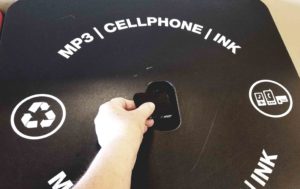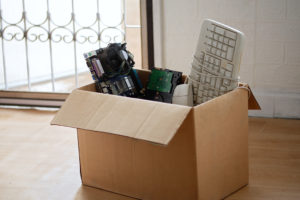As the second-most densely populated state in the US, New Jersey produces a lot of waste. Every day, residents of The Garden State throw away an average of 4.4 pounds of trash each, and with a population nearing nine million, it’s no surprise this adds up fast.
This disposable attitude has made the US the world’s largest producer of trash, with around 250 million tons of waste ending up in landfill every year. To add to the problem, much of what currently ends up in landfill could be recycled if the right collection sites and recycling services were made available.
Old electronics are an example, and today, careless disposal makes up a significant proportion of the waste that’s thrown away. This has a significant impact on the environment, especially considering that discarded electronics can contain harmful chemicals like arsenic, lead, and cadmium, as well as taking hundreds or thousands of years to decompose.
Thanks to the increasing number of electronics in circulation, this is a problem that’s likely going to get worse. According to a United Nations University report, 53.6 million tons of e-waste was produced in 2019, a 21% increase to 2014. In response, cities and states across the US are beginning to take action, and the State of New Jersey has implemented a number of recycling programs designed to help both businesses and individuals to dispose of their electronics responsibly.
Here, we take a closer look at e-waste recycling facilities in New Jersey and learn how you can safely divert your old electronics away from landfill.
What e-waste can be recycled in New Jersey?
The New Jersey Electronic Waste Management Act states that all electronics should be disposed of in a responsible way when they come to the end of their useful lives. The act, which came into force on January 1, 2011, made it illegal for old computers, monitors, televisions, and other covered electronic devices to be sent to landfill. Instead, these items have to be dealt with at dedicated recycling centers that offer facilities for electronic equipment where they can either be recycled or disposed of responsibly.
Among the electronics covered by the Act are:
- Desktop computers
- Laptops
- Televisions
- Monitors
- DVD players
- Printers
- Games consoles
These products can all be recycled for free in New Jersey, and free recycling programs are open to individuals and businesses with fewer than 50 full-time employees. Larger companies will need to arrange their own electronics recycling programs that ensure waste is disposed of at the correct facilities or risk a fine.
In addition to these measures, the State of New Jersey has laid the foundation for extended producer responsibility programs that design waste out of the loop. As part of the New Jersey Electronic Waste Management Act, electronics manufacturers are now required to register with the New Jersey Department of Environmental Protection. These manufacturers are asked to pay a registration fee of $5,000 and submit a plan outlining how they would collect and recycle their share of old electronics.
The submitted plan must include information on the processes and methods that would be used to recycle recovered electronic devices, a description of their recycling processes, and the name and location of all authorized drop-off locations and recyclers within the New Jersey area.
This means that, in order to ensure that manufacturers take responsibility for the disposal of their share of e-waste, it became illegal to sell electronics without a manufacturer’s label. Manufacturers are also now required to make customers aware of the e-waste recycling options open to them on the local and national scales, either through manufacturer webpages or in-store.
Why should I recycle electronics in New Jersey?
There are a lot of reasons to recycle e-waste in New Jersey. For a start, electronics that are sent to landfill, or otherwise incorrectly disposed of, can leak toxic chemicals into the ground. Over time, this can cause serious environmental issues and damage local ecosystems, as well as impact human health.
Recycling electronics also allows us to make the most of the materials they contain. A lot of the elements found in old equipment such as computer monitors, fax machines, cellphones, and game consoles can be reused, allowing us to extend the lifespan of our finite resources. This includes precious metals such as gold and silver, as well as toxic chemicals that are hard to mine such as lithium and cadmium.
What’s more, properly disposing of used electronics can help to protect your data once items such as hard drives are no longer usable. Authorized e-waste recycling centers will ensure that all data contained on your old devices is destroyed through shredding or other destructive processes. This will prevent your sensitive information from falling into the wrong hands, a particular risk if left in open air landfill sites.
Last but definitely not least, you should recycle electronics in New Jersey because sending e-waste to landfill is against the law. Individuals and businesses caught dumping consumer electronics can face fines and, in certain cases, prosecution.
Where can I dispose of electronics in New Jersey?
If you have an old computer, TV, CRT monitor, printer, or games console that you want to recycle, the first thing you’ll need to do is find your nearest e-waste collection point. The Department of Environmental Protection has a full list offering guidance on where to recycle electronics in New Jersey on its website. These are listed by county and municipality, making it easy to find a location near you.
A selection of drop-off points in New Jersey is listed below:
- Burlington Country Resource Recovery Complex
- Medford Attended Donation Center
- Woodcrest Shopping Center
- Cape May County Municipal Utility Authority
- Cumberland County Public Works
Curbside recycling is also available in a number of cities and municipalities including:
- Atlantic City
- Linwood
- Somers Point
- Clementon
- Greenwich
If your old electronics are too heavy to lift (for example, items weighing in excess of 50lbs and TVs with a screen larger than 40 inches when measured diagonally), you can arrange for free collection from your address. If you want to know where to dispose of electronics in New Jersey that are too heavy to carry, you’ll find a list of organizations offering collection for oversized electronics here.
If you’ve checked the list of where to dispose of electronics in New Jersey and not found a convenient location for your drop-off, you could try a local store or charity. A number of national chains accept e-waste, giving you another convenient option for your electronics disposal.
Stores and charities in New Jersey that recycle e-waste include:
- Best Buy
- Staples
- Savers
- Goodwill
- The Salvation Army

How else can I recycle electronics in New Jersey?
Most recycling facilities and programs in New Jersey are designed for individual consumers and small companies. Larger organizations, and those that produce significant amounts of e-waste, will need to make alternative arrangements for the disposal of their electronics.
Waste management companies, like RTS, specialize in offering e-waste solutions to larger companies and other organizations. Our fleet of digitally connected haulers collects from businesses across the state. These services can be ongoing or one-off, with on-demand collections available as and when required.
Wherever possible, it’s always best to repair and reuse old electronics. Keeping digital devices in circulation helps to minimize e-waste and make the most of our precious resources. Additionally, organizations like the Electronic Access Foundation help companies and institutions donate their old electronics to local charities.

Source: rts.com
If you’d like RTS to guide your business towards its e-waste goals and prepare your company for the future of sustainability in New Jersey, contact a member of our team today.
Additionally, if you’d like to learn more about recycling e-waste in our other locations within the US, please refer to our other electronics recycling guides:
- How to Recycle Electronics in Boston
- How to Recycle Electronics in Chicago
- How to Recycle Electronics in Dallas
- How to Recycle Electronics in New York
- How to Recycle Electronics in Philadelphia
- How to Recycle Electronics in Washington DC
For more information on how your business can help in the fight against food waste, contact our TRUE Advisors today to discuss your specific requirements. Additionally, subscribe to the RTS blog for more news and insights on waste management and sustainability.






